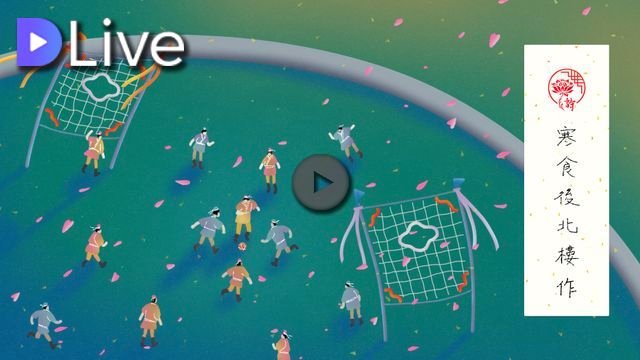Chinese poem - “Written at Běi lóu after hánshí festival” by Wei Yingwu (Includes original song and video) | 《寒食後北樓作》- 韋應物 (內有原創樂曲及影片)
Hi there! We’re more than half way through the group stages of the World Cup already, how did your team do? Were there any surprises for you? For me, I was surprised by the outcome of a few of the matches. Talking of surprises, would you be surprised if I told you nearly 15 centuries ago football matches were already held in China? And we’ve got Tang poems to prove that. Follow us to check it out.
世界盃32強的分組賽事已經進行一半了,不知大家喜愛的球隊成績如何?賽果有沒有出現意想不到的情況?對我來說,這一屆的賽事真的讓人驚喜,意想不到!同樣的,如果我說一千四五百年前的唐朝,已經有足球賽事的話,你應該更感到驚喜吧!是的!中國早於古代已有足球賽事,更有詩為證,現在就讓我們了解一下!
The Background 創作背景
In the old days hánshí jié was an important festive date in the China. It falls around the spring time and normally people don’t go out during this day. With little to do in those days, cù jū (ancient football) became a popular past time activity for many.
The people from the Tang dynasty enjoyed many types of ball games, apart from polo (yes they had in those days as well) cù jū was another popular sport. Many of the emperors were avid fans and players, as were many well known poets including Li Bai and Du Fu whom we’ve introduced in the past, and also Wei Yingwu, our poet this week . They wrote many poems about cù jū in their days. In fact if we were to form a Tang poet football team and get them to recite their poems while playing cù jū, I imagine it will be so much more interesting than watching a celebrity football team play!
寒食節是中國古代非常重要的節日,通常街道上都會一片冷清,人們足不出戶,待在家中渡過寒食節。在古代缺乏娛樂的生活基調,蹴鞠是貴族平民都能享受的體育活動。
唐人熱愛球類運動,除了馬球外,蹴鞠便是唐人經常接觸的球類運動。唐太宗李世民、唐玄宗李隆基都是鐵桿球迷,唐僖宗更經常親身上陣踢球。詩人李白、白居易、王維與杜甫都是蹴鞠的愛好者,留下不少描述蹴鞠的詩句。
韋應物亦是其中一位喜愛蹴鞠的詩人,要是能組成一隊「詩人蹴鞠隊」,一邊踢球一邊吟詩,想必比起明星足球隊更有風範呢!
“Written at Běi lóu after hánshí festival” by Wei Yingwu 韋應物《寒食後北樓作》
園林過新節,風花亂高閣。
yuán lín guò xīn jié , fēng huā luàn gāo gé
遙聞擊鼓聲,蹴鞠軍中樂。
yáo wén jī gǔ shēng , cù jū jūn zhōng lè
The Composition 詩句大意
The poem “Written at Běi lóu after hánshí festival” has four lines and is best explained in two parts
《寒食後北樓作》共四句,按詩的結構劃分,可分為兩個層次。
Part 1 : The scene in the park after hánshí festival 層次一:寒食節後的園林景象
「園林過新節,風花亂高閣」
yuán lín guò xīn jié , fēng huā luàn gāo gé
Spending the hánshí festival at the park and looking down from the balcony, the flowers are all swaying as the wind blows
解釋:在園林裡渡過新的節令(寒食節)。在高處的閣樓,觀看風把繁花吹亂。
####Part 2 : The cù jū match after the hánshí festival 層次二:寒食節後的蹴鞠比賽
「遙聞擊鼓聲,蹴鞠軍中樂」
yáo wén jī gǔ shēng , cù jū jūn zhōng lè
The army are playing cù jū from far away and one can hear the sounds of the beating drums. This is an entertainment for us
解釋:聽見遠處傳來擊鼓的聲音,那是軍隊正在進行蹴鞠比賽,作為娛樂節目。
The Poetic Structure格律特點
Sentence 句式
There are four lines in this poem making this a jué shī or quatrain, and each line has 5 words, so this is a five word quatrain.
全詩共四句,符合絕詩四句的句式特點。而全詩每句均是工整的五個字,可將此詩納為「五言絕詩」。
Highlight of the poem 精選句子
「遙聞擊鼓聲,蹴鞠軍中樂」
yáo wén jī gǔ shēng , cù jū jūn zhōng lè
In our previous post we introduced two types of cù jū games from the old days, zhù qì and bái dǎ. If you missed our previous post you can check it out here https://steemit.com/dlive/@ccp-hk/24f20520-6fd8-11e8-8587-fb4bcb1f0470. This week we’re going to introduce a third type that was normally play in the army as part of their training, and is very similar to modern day football.
This is called jū chéng (wall) as there is a low wall surrounding the playing field, similar to the white line we have today. Two teams of 12 compete in each match and the emphasis is on using your body to touch the ball. Again that’s like modern day football but with one more player in each team. On each end of the field, a net is tied to a pair of bamboo poles, this is the goal, and the objective is to kick as many goals into the net as possible within the set time. Apart from the players, there is a also a jū zhèng (official) ie the referee. So you can see, in the Tang dynasty they already used football to train the soldiers, that is so innovative and fun.
早前為大家介紹了唐代兩種蹴鞠的方式,分別是「築球」與「白打」,如有興趣重溫,可細閱:
https://steemit.com/dlive/@ccp-hk/24f20520-6fd8-11e8-8587-fb4bcb1f0470這次會為大家介紹蹴鞠的另一種玩法,是軍隊的訓練與娛樂活動,跟現今大家所認識的足球玩法更加相似。
軍中的蹴鞠方式以直接身體對抗為主,以短牆劃出踢球的場地範圍,叫「鞠城」,像現今足球以白線畫出的球場。場上分兩隊作賽,每隊各有12名隊員,比現今足球每隊11人還要多一名球員呢!場地兩端豎起竿子,並在竿上結網,形成球門,跟現今足球的球門非常相似。比賽的輸贏,以兩隊於限時內的進球數量決定,哪一隊多進球便是勝方。
場上除了球員之外,亦設有裁判主持比賽,稱為「鞠政」,也就是現今的「球證」呢!古代的蹴鞠能訓練軍人的體能與團隊合作意識,是非常實用且有趣的練兵方法啊!
The music and sketch 詩與畫
This week we have added a samba theme to our song to make it more exhilarating, just like when we’re watching the football match. The madarin version is performed by @susanlo and the cantonese version by @tine. In the middle section we have adding a commentary by a well known cantonese speaking football commentator, hopefully you will like this new little experiment of ours.
From you sketch, you can see that the set up of the whole match is actually quite similar to the modern day football, the only difference being the goal. Sadly, China won’t be playing in the World Cup.
在這一次的歌曲創作中,我們嘗試加入了森巴嘉年華的感覺,一種喜悅、刺激且興奮的感覺,正正與一場足球比賽的氣氛一樣!國語部份由@susanlo 主唱,粵語部份由 @tine 主場,而在中間的Bridge中,我們借用了一名足球評論員的粵語評論,希望給大家帶來更新鮮有趣的感覺!
其實,從畫中所見,古代的「鞠城」真的跟現代足球很像,唯一分別就只是球門的形狀,只可惜,今次世界盃中,中國隊又進不了決賽週....
A final word from this week’s post. Since we started the project, @perlia has been translating the ancient Tang poems for us into modern day simple language that we can all understand. Unfortunately she has to leave the team for a while to take a break. Her replacement is the multi talented @susanlo who has already sang 5 songs for us. In future, she will take on the role of literature translation as well. A big welcome to @susanlo to the team and we wish @perlia a speedy recovery and that you will be back soon.
Next week will be a new team and and new post. Till then, take care!
在這一期的結語,我們有一個重大的消息要宣佈!一直為我們進行詩詞解析的 @perlia 將會暫時離開樂筆詩塾,休息一下,至於接替 @perlia的,將會是CN區的大紅人,已為我們唱了5首歌的 @susanlo ! @susanlo 以後除了繼續演唱我們歌曲的國語部份,更會接替 @perlia 為我們解析詩詞,噢!美女真是多才多藝啊!不過,這不代表 @perlia 將永遠離開,在不久的未來,@perlia 休息過後,同樣也是會回到樂筆詩塾的!
就讓大家期待我們下一期的新組合、新文章!
Production Team 製作團隊
Literature Translation 詩歌解析: @perlia
Music 音樂: @kona
Art 插圖: @nanosesame
Video 視頻: @aaronli
English Editor 英語編輯: @livinguktaiwan
Chinese Editor 中文編輯: @aaronli
My video is at DLive





制作得不错的节目,还难得的与世界杯联系起来!
謝謝欣賞我們的精心挑選 ^o^
長知識了。原以爲蹴鞠都是高俅那種玩法呢。
我也是,這種玩法技術要求度超高的xD
不知道有沒有 寒食後北里作
可以大家一起玩足球就好啦!
我當啦啦隊~
知客還在青樓中?🙄🙄
求解詩